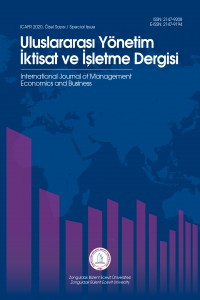COVİD-19 PANDEMİSİNDE MUHASEBE DERSLERİNDE UYGULANAN UZAKTAN EĞİTİM YÖNTEMLERİNİN İNCELENMESİ VE BİR MODEL ÖNERİSİ
Abstract
Covid-19 pandemisi, tüm dünyada olduğu gibi ülkemizde de kısa zaman içinde insan yaşamının her anını etkisi altına almıştır. Bu durumdan eğitim de önemli ölçüde etkilenmiş ve yoğun olarak yüz yüze yapılan eğitim şeklinin neredeyse tamamı uzaktan eğitime dönüştürülmüştür. Pandemi öncesinde eğitimde önemli bir yeri olan teknoloji, pandemi sonrasında uzaktan eğitim ile birlikte eğitim sektörüne yön veren bir konuma gelmiş ve eğitimde yeni yöntemler ortaya çıkmaya başlamıştır. Muhasebe derslerinin zorluğu algısı ile öğrenciler yüz yüze eğitimde bile birçok sorun yaşamakta iken, uzaktan eğitimde bu sorunların daha da arttığı gözlenmektedir.
Muhasebe eğitimi de, pandemi ile birlikte asenkron veya senkron şekilde yürütülmekte olan eğitim ortamında yeni model arayışı içine girmiştir. Çalışmanın amacı, pandemi döneminde muhasebe eğitiminde uygulanan öğretim yöntemlerini ortaya koymak suretiyle yeni modellerin geliştirilmesine katkı sunmaktır. Bu kapsamda altı üniversiteden muhasebe derslerini veren on iki akademisyen ile kartopu örneklemesi yöntemi kullanılarak, yarı yapılandırılmış mülakat yapılmıştır. Araştırma soruları çerçevesinde uyguladıkları eğitim şekilleri konusunda çıkarımlar ortaya konularak nitel analiz uygulanmıştır. Çalışma sonucunda öğrencilerin derse katılım oranının düşük olması, ölçme ve değerlendirme sonuçlarının güvenilirliğinin zayıf olması, öğrenci ile iletişimin zor olması gibi bulgulara ulaşılmıştır. Bu bakımdan gelecek çalışmalar için konunun öğrenciler açısından nitel veya nicel bir yöntem ile ele alınması ve elde edilen sonuçların karşılaştırılması önerilmektedir.
Keywords
Thanks
Akademisyenlere bu imkânı sundukları için Yayın Kurulu ve tüm emeği geçenlere teşekkürlerimi sunarım.
References
- Al, U. & Madran, O. (2004). Web Tabanlı Uzaktan Eğitim Sistemleri: Sahip Olması Gereken Özellikler ve Standartlar, Bilgi Dünyası, 5(2), 259-271.
- Arat, T. & Bakan, Ö. (2011). Uzaktan Eğitim ve Uygulamaları, Selçuk Üniversitesi Sosyal Bilimler Meslek Yüksekokulu Dergisi, 14(1), 363-374.
- Bozkurt, A. (2020). Koronavirüs (Covid-19) Pandemi Süreci Ve Pandemi Sonrası Dünyada Eğitime Yönelik Değerlendirmeler: Yeni Normal Ve Yeni Eğitim Paradigması, Açıköğretim Uygulamaları ve Araştırma Dergisi, 6(3), 112-142.
- Chen,C.C., Jones,K.T. & Moreland,K. (2010). Distance Education in a Cost Accounting Course: Instruction, Interaction, and Multiple Measures of Learning Outcomes. The Journal of Educators Online, 7(2), 1-20.
- Kurnaz, E. & Serçemeli, M. (2020). Covıd-19 Pandemi Döneminde Akademisyenlerin Uzaktan Eğitim Ve Uzaktan Muhasebe Eğitimine Yönelik Bakış Açıları Üzerine Bir Araştırma, Uluslararası Sosyal Bilimler akademi Dergisi, 3(3), 262-288.
- Özer, G., Günlük, M. & Özcan M. (2019). Muhasebe Akademisyenlerinin Muhasebe Eğitiminde Uzaktan Eğitim Uygulamaları Kullanımına Yönelik Algılarının Teknoloji Kabul Modeli Çerçevesinde İncelenmesi, Muhasebe ve Vergi Uygulamaları Dergisi, 12(1), 65-90.
- UNECCO, (2020). Startling Digital Divides In Distance Learning Emerge, https://en.unesco.org/news/startling-digital-divides-distance-learning-emerge. 17.10.2020
AN INVESTIGATION OF DISTANCE EDUCATION METHODS APPLIED IN ACCOUNTING COURSES IN COVID-19 PANDEMIC AND A MODEL PROPOSAL
Abstract
The Covid-19 pandemic has affected every moment of human life in a short time in our country as well as all over the world. Education was also significantly affected by this situation and almost all of the intensive face-to-face education was transformed into distance education. Technology, which had an important place in education before the pandemic, has reached a position that directs the education sector with distance education after the pandemic and new models in education have started to emerge. While students experience many problems even in face-to-face education with the perception of the difficulty of accounting courses, it is observed that these problems increase even more in distance education.
Accounting education has also sought a new model in the education environment that is carried out asynchronously or synchronously with the pandemic. The aim of the study is to contribute to the development of new models by revealing the teaching methods applied in accounting education during the pandemic period. In this context, semi-structured interviews were conducted with twelve lecturers who teach accounting courses from six universities, using the snowball sampling method. Qualitative analysis was applied by making inferences about the education styles they applied within the framework of the research questions. As a result of the study, it was found that the student participation rate was low, the reliability of measurement and evaluation results was poor, and communication with the student was difficult. In this respect, for future studies, it is recommended that the subject be handled with a qualitative or quantitative method and the results obtained should be compared.
References
- Al, U. & Madran, O. (2004). Web Tabanlı Uzaktan Eğitim Sistemleri: Sahip Olması Gereken Özellikler ve Standartlar, Bilgi Dünyası, 5(2), 259-271.
- Arat, T. & Bakan, Ö. (2011). Uzaktan Eğitim ve Uygulamaları, Selçuk Üniversitesi Sosyal Bilimler Meslek Yüksekokulu Dergisi, 14(1), 363-374.
- Bozkurt, A. (2020). Koronavirüs (Covid-19) Pandemi Süreci Ve Pandemi Sonrası Dünyada Eğitime Yönelik Değerlendirmeler: Yeni Normal Ve Yeni Eğitim Paradigması, Açıköğretim Uygulamaları ve Araştırma Dergisi, 6(3), 112-142.
- Chen,C.C., Jones,K.T. & Moreland,K. (2010). Distance Education in a Cost Accounting Course: Instruction, Interaction, and Multiple Measures of Learning Outcomes. The Journal of Educators Online, 7(2), 1-20.
- Kurnaz, E. & Serçemeli, M. (2020). Covıd-19 Pandemi Döneminde Akademisyenlerin Uzaktan Eğitim Ve Uzaktan Muhasebe Eğitimine Yönelik Bakış Açıları Üzerine Bir Araştırma, Uluslararası Sosyal Bilimler akademi Dergisi, 3(3), 262-288.
- Özer, G., Günlük, M. & Özcan M. (2019). Muhasebe Akademisyenlerinin Muhasebe Eğitiminde Uzaktan Eğitim Uygulamaları Kullanımına Yönelik Algılarının Teknoloji Kabul Modeli Çerçevesinde İncelenmesi, Muhasebe ve Vergi Uygulamaları Dergisi, 12(1), 65-90.
- UNECCO, (2020). Startling Digital Divides In Distance Learning Emerge, https://en.unesco.org/news/startling-digital-divides-distance-learning-emerge. 17.10.2020
Details
| Primary Language | Turkish |
|---|---|
| Subjects | Business Administration |
| Journal Section | Research Articles |
| Authors | |
| Publication Date | July 31, 2021 |
| Submission Date | December 18, 2020 |
| Acceptance Date | December 27, 2020 |
| Published in Issue | Year 2021 Issue: 17 - ICAFR 2020 Özel Sayı |


